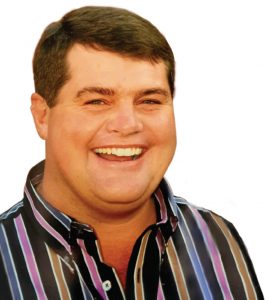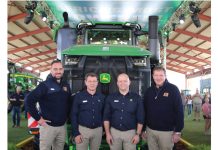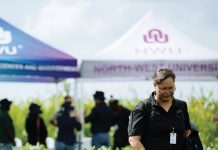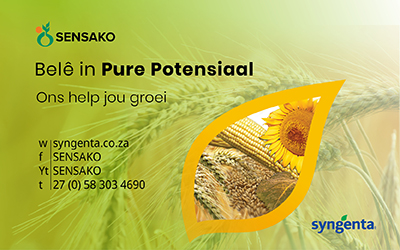 We often say that farming flows through the veins of a passionate producer, but when you meet Fanie Pienaar, you will truly understand what this means. Hailing from Clocolan in the Free State, this fifth-generation producer has years of knowledge, experience and skills which he applies as a trainer for the Grain SA Farmer Development Programme.
We often say that farming flows through the veins of a passionate producer, but when you meet Fanie Pienaar, you will truly understand what this means. Hailing from Clocolan in the Free State, this fifth-generation producer has years of knowledge, experience and skills which he applies as a trainer for the Grain SA Farmer Development Programme.
Born producer becomes passionate teacher
Fanie grew up on a farm in the Winburg area, where he began learning about farming almost before he could walk and talk. He later farmed in the Ficksburg area for 20 years on rental land before moving his family and farming operation to the family farm in Clocolan. Here he manages a mixed farming operation where soybeans and maize form the core of the crop production. He also breeds parrots, mainly for the export market. Fanie’s wife, Elizabeth, also farms and their three daughters, aged 8, 11 and 15, all share their parents’ passion and are involved in the farming operation.
Although he wasn’t aware of his other passion, namely teaching, good neighbourliness led to this discovery. Fanie’s path crossed with that of his neighbour, Isaac Khuto, when he was a relatively new producer with little equipment. When Fanie discovered that Isaac, whose fields were clean and ploughed, could not plant as he did not own a planter, he offered to do the planting for him. A friendship between these two passionate farmers developed from here.
Isaac later became a finalist in Grain SA’s Developing Grain Producer of the Year competition. In an article in Farmer’s Weekly of 9 February 2009, Isaac said that Fanie’s advice was crucial to his transformation from beginner farmer to recognised emerging farmer. He added that Fanie was always there wheneverhe needed support.
Through Isaac’s nomination for the competition, the Grain SA farmer development team became aware of Fanie’s assistance and paid him a visit. ‘They told me I was a mentor to Isaac. That was actually the first time I had heard of being a mentor – however, I did not see it as mentorship. In my eyes I was only helping a fellow farmer who loved what he was doing as much as I did.’
Fanie then went through the preparation to become a regular trainer for the programme. After his first presentation at one of provincial coordinator Johan Kriel’s sessions at a farmers day in Ladybrand, his passion for teaching was ignited. ‘I thoroughly enjoyed sharing my knowledge with others and it always gives me quite an energy boost.’ Fanie has since become a trainer for the Free State and North West. He is still a full-time producer and has to plan the training sessions around his own farming activities.
‘Apart from a passion for your subject matter and knowledge of people, languages skills are the most important thing to be an effective trainer,’ says Fanie who is fluent in Sotho. As he can speak, read, write and even pray in Sotho, he jokingly adds that it is his second language and English only his third.
To Fanie the agronomy sessions are always a highlight. ‘The planting courses (for soybeans, maize, sunflower, sorghum and groundnuts) are my favourites, as I have experience in this field and can really share my own knowledge with the farmers as well.’ Other courses like welding, tractor maintenance, business ethics and ‘Farming for profit’ all form part of the curriculum compiled by Grain SA.
Closing the gaps
Fanie practises minimum tillage and promotes it whenever he has the opportunity. Many of the farmers who have formed a close bond with him got on board with these practices after witnessing the results. They also contact him regularly for advice via WhatsApp.
He later wants to progress to no-till. ‘Your soil fertility, however, has to be on a high level for these practices to be applied. Whatever I do in my own farming operation as far as soil fertility is concerned, I share with the farmers on my contact list.’
Fanie is sensitive to older farmers who firmly believe in the older way of doing things. ‘I would never force my practices on anyone and I help each farmer as best as I can.’
About 20 to 25 people are allowed to attend a course. The farmers who know Fanie and are in regular contact with him, are always first to apply when he advertises a course.
The fact that very few younger family members are involved in the farming operations worries Fanie. ‘There are people born in 1940 attending the courses. Where are the young people?’ He sees it as his duty to stay involved in the programme to contribute in closing this generation gap – in getting the youth excited about agriculture.

He loves sharing in the excitement of farmers who are making progress and achieving success – whether it is by increasing their yield or reaching their goal of purchasing their own land. The fact that people trust him and take on board what he is teaching, has become one of the most satisfying experiences in his life. Fanie doesn’t mind if farmers ask challenging questions as long as they remember that to get the right answer, they must ask the right question.



















